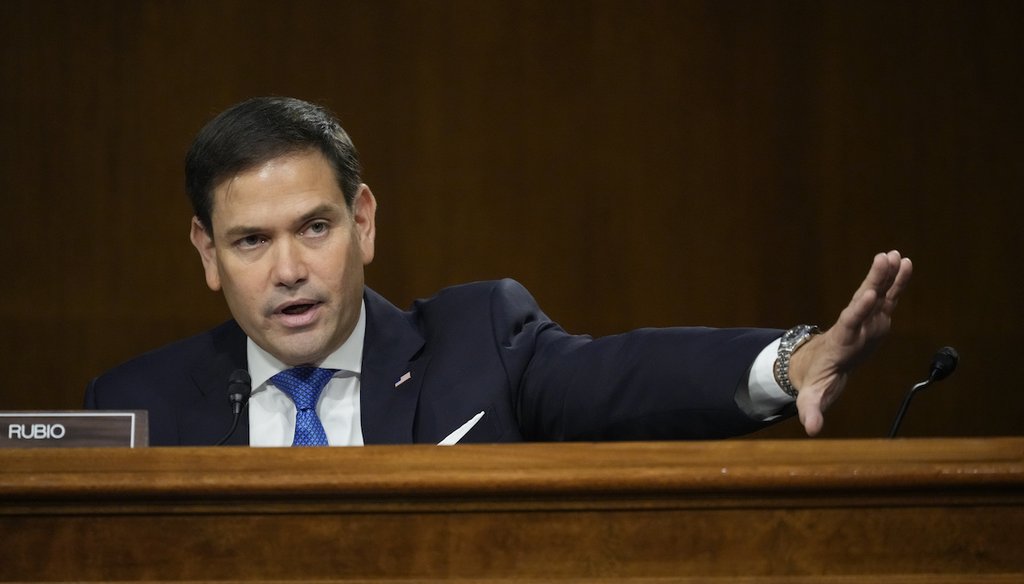Stand up for the facts!
Our only agenda is to publish the truth so you can be an informed participant in democracy.
We need your help.
I would like to contribute

Sen. Marco Rubio, R-Fla., during a Senate Foreign Relations Committee hearing on Sept. 14, 2021, in Washington. (AP)
If Your Time is short
-
The ad said Rubio doesn’t support abortion for victims of rape or incest. But we found two instances in which Rubio backed legislation to restrict access to abortion that included exceptions for rape and incest. In a 2015 interview, Rubio said he had compromised his view regarding those exceptions to “save lives in this country.”
-
The ad said Rubio “wrote the bill to criminalize doctors.” We did not find evidence that Rubio wrote the Pain-Capable Unborn Child Protection Act, which would have made performing an abortion past 20 weeks a federal crime. But he did co-sponsor it. Rubio also introduced a bill to make it a crime to perform an abortion on a minor from another state without parental consent.
-
The ad said Rubio voted to “mandate unmarried women to publicize their sexual encounters.” In 2001, then-state Rep. Rubio did vote for legislation dubbed the “Scarlet Letter” bill by critics because it required some women to publish a notice that detailed their sexual history when placing a child up for adoption.
U.S. Rep. Val Demings, D-Fla., said her opponent in Florida’s U.S. Senate race, Republican Sen. Marco Rubio, has a staunch record of voting to restrict reproductive health care for women.
In a campaign ad, Demings’ campaign highlighted Rubio’s previous remarks concerning abortion and his support of legislation to limit the procedure.
"Rubio supports forced pregnancy, even for victims of rape and incest." the ad said. "He wrote the bill to criminalize doctors, including jail time. Even worse, Rubio voted to mandate unmarried women to publicize their sexual encounters."
Rubio’s votes on abortion exceptions for rape, incest are mixed
Ahead of the U.S. Supreme Court’s ruling to overturn the precedent set with Roe v. Wade, Rubio declined to repeat his stance on abortion and whether he supported any exceptions for rape or incest.
Instead, Rubio told reporters May 3, "My position on abortion has been stated repeatedly. You can look it up, it's online."
We did. Throughout Rubio’s decades in politics, he has remained largely consistent in his view that "all human life at every stage of its development is worthy of protection."
He’s repeated this stance in multiple interviews and backed measures aiming to limit access to abortion. National Right to Life gave Rubio a 100% rating when evaluating his 12 votes in the 2021-22 session, which included legislation that would have prohibited abortions after 20 weeks.
But his record on exceptions is not as clear cut. Though Rubio has stated a preference for banning abortions in all cases other than to save the life of the mother, PolitiFact found two examples of Rubio supporting legislation that did include exceptions for rape or incest.
In 2013, Rubio was one of 40 co-sponsors of the Pain-Capable Unborn Child Protection Act. The Senate bill, which failed to overcome a filibuster, aimed to prohibit abortion at 20 weeks or later, with an exception for rape and incest.
Rubio also backed a similar proposal in 2015 that also included exceptions for rape and incest. Still, he was hesitant to suggest that he believed that rape or incest were justifiable reasons to have an abortion.
During Rubio’s primary bid for president in 2016, Fox News anchor Megyn Kelly asked whether he supported a rape and incest exception to abortion bans.
"I have never said that, and I have never advocated that," Rubio said. PolitiFact found that claim to be inaccurate.
During an August 2015 appearance on Glenn Beck’s radio show, Rubio said the procedure should be banned except if the mother’s life was endangered.
"Now I recognize that other people don’t hold that view," Rubio told Beck. "In order to save lives in this country, I have supported bills that had to have exceptions in them."
It’s also worth noting that Rubio has backed legislation without such exceptions. In 2000, then-state Rep. Rubio voted for a ban on abortion later in pregnancy, which critics call "late-term abortion," per the Miami Herald.
The bill didn’t include a rape exception, but it did allow doctors to intervene to save the mother’s life. The legislation cleared Florida’s Legislature and was signed into law later that year.
Another example is a 2013 U.S. Senate bill that Rubio co-sponsored, which would have limited access to abortion in the District of Columbia. Again, the bill makes an exception to save the life of the mother but not for rape or incest.
When we asked Demings’ campaign about the claim, a spokesperson cited PolitiFact’s previous coverage of Rubio’s abortion record.
Rubio supported bill to put abortion doctors in prison, but did not write bill highlighted in ad
We found that Rubio supported legislation that would put abortion doctors in prison, but we couldn’t find evidence that he wrote the bill highlighted in the ad.
Demings’ campaign pointed to the Pain-Capable Unborn Child Protection Act, initially introduced in the Senate in 2013 and then again in 2021.
The bill would have imposed a prison sentence of up to five years on physicians who performed an abortion past 20 weeks.
During the 113th and 117th Congresses, Rubio was one of 45 co-sponsors of the bill in the Senate. But contrary to the ad’s suggestion, PolitiFact found no evidence that he wrote it.
Former Republican Rep. Trent Franks of Arizona first introduced the legislation in 2013. In the Senate, Sen. Lindsey Graham, R-S.C., sponsored and introduced the bill twice.
Still, Rubio has tried to criminalize abortions in other ways. In 2019, for example, Rubio introduced the Child Interstate Abortion Notification Act.
The bill would have made it a federal crime for physicians to perform an abortion on a minor from another state without parental consent. Violators could have faced a prison sentence of up to one year.
Rubio did vote for Florida’s ‘Scarlet Letter’ law
The Demings ad closes with what it considers a troubling aspect of Rubio's record: "Even worse, Rubio voted to mandate unmarried women to publicize their sexual encounters."
In 2001, the Florida Legislature considered HB 141, dubbed the "Scarlet Letter" bill by critics. The bill aimed to ensure that a birth father consented to a child being placed for adoption to avoid future legal challenges that could "disrupt the life of the child."
If a mother seeking to put her child up for adoption did not know the biological father's identity, the legislation required that she take steps to try to notify the father. The bill required women to publish a notice in the newspaper that included their "age, race, hair and eye color."
It also directed that the mother include a list of people she suspects to be the father and any date and city where conception may have occurred. The advertisement had to run once a week for a month, according to a 2004 Notre Dame Law Review article.
The bill passed in the state’s House and Senate and was ultimately signed into law by then-Gov. Jeb Bush.
Rubio, then a state representative for Miami, was among those who voted in favor of the bill, per a 2001 journal of the state’s House of Representatives. It’s worth noting that he supported the unanimous effort to repeal the law in 2003.
According to The New York Times, lawmakers favored the repeal because the law had "produced unintended consequences" for women.
Two years after the "Scarlet Letter" law passed, the notice requirement was replaced with a "father registry" that allowed men to voluntarily provide similar information.
RELATED: Now that Roe is gone, what happens in the states?
RELATED: All of our fact-checks about abortion
RELATED: Can states punish women for traveling out of state to get an abortion?
Our Sources
Youtube, Marco Rubio's Plan for Women, May 20, 2022
Rubio’s Plan for Women, accessed June 29, 2022
Business Insider, "Republican senators won't say if they support rape and incest exceptions to abortion bans: 'Come back and see me after the Supreme Court rules,’" May 3, 2022
National Right to Life Congressional Scorecard U.S. Senate, accessed June 29, 2022
Miami Herald, "Florida prohibits late-term abortions," accessed in Nexis June 29, 2022
YouTube, "Rubio: ‘I have never said’ I support an exception for rape and incest ‘and never advocated for it’," Aug. 6, 2015
PolitiFact, "Rubio said he's never advocated for abortion exceptions for rape or incest," Aug. 7, 2015
PolitiFact, "Patrick Murphy says Marco Rubio would take away a woman’s right to choose for victims of rape and incest," Sept. 23, 2016
Florida House of Representatives, SB 160, accessed June 29, 2022
Congress.gov, S. 886, accessed June 29, 2022
Congress.gov, S. 1670, accessed June 29, 2022
Congress.gov, S. 1533, accessed June 29, 2022
Congress.gov, S.61, accessed June 29, 2022
Congress.gov, H.R.1797, accessed June 29, 2022
Congress.gov, S.109, accessed June 29, 2022
Marco Rubio U.S. Senator for Florida, "Rubio, Graham, Colleagues Reintroduce Pain-Capable Unborn Child Protection Act," accessed June 29, 2022
Marco Rubio U.S. Senator for Florida, "Child Interstate Abortion Notification Act," accessed June 29, 2022
Salon.com, "Rubio reaffirms opposition to rape and incest exceptions: He backs abortion ban ‘irrespective of the circumstances,’" Aug. 17, 2015
Florida House of Representatives, HB 141 bill text, accessed June 29, 2022
Notre Dame Law Review, To Unknown Male: Notice of Plan for Adoption in
the Florida 2001 Adoption Act, Feb. 1, 2004
Florida House of Representatives, 2001 journal, accessed June 29, 2022
New York Times, Florida 'Scarlet Letter' law is repealed by Gov. Bush, May 21, 2003
HuffPost, "Marco Rubio and five members of Congress voted for Florida's 'Scarlet Letter' adoption bill," June 11, 2015
Interview with Christian Slater, communications director for Demings’ campaign, June 29, 2022
Interview with Elizabeth Gregory, spokesperson for Rubio’s campaign, June 29, 2022
CBN News, "Marco Rubio On Life Issue: I would rather lose an election than be wrong on that issue," Nov. 30, 2015






















































